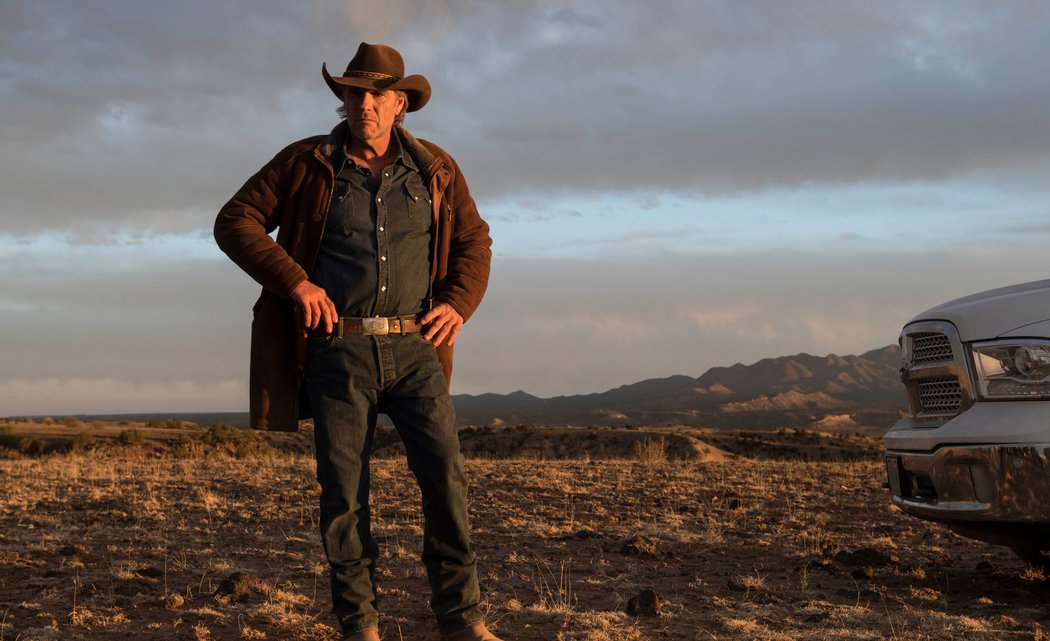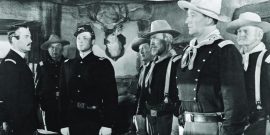One of the best films ever made, Fort Apache shows that the modern world is still capable of virtue.
Longmire's Last Ride
Tonight, the sixth and final season of Longmire, the Western series produced by Netflix, begins streaming. Based on Craig Johnson’s Sheriff Walt Longmire mystery novels, the show has earned an intense, devoted following. Originally it was an A&E series, the most watched scripted drama ever produced by the channel. When Longmire was inexplicably cancelled in 2014 after its third season, fans were incensed. Netflix, sensing an undervalued market opportunity, quickly picked up the series. By most accounts, Longmire has grown as a dramatic series under Netflix’s auspices.
It’s not hard to understand why. Take the man in the lead, Sheriff Walt Longmire (Robert Taylor), the eponymous hero. He is overaged and too withdrawn, even depressed, to be an inspiring cowboy lawman dressed in white. But Longmire, who holds elected office in fictional Absaroka County, Wyoming—the least populated county of the least populated state in America, says Johnson—faces an “immediacy” or accountability to the people and to the land. He stands tall in an open, nearly unpeopled Western landscape whose vastness invites our imagination.
Joining Longmire is Victoria (“Vic”) Moretti (Katee Sackhoff), a displaced Philadelphia cop, remaking her life and career in Wyoming. She had to leave Philly after testifying against a fellow police officer for corruption. Doing the right thing cost her dearly. Later, Ed (Lee Tergesen), a former officer and friend of the man she put away, tracks her down and stalks her, hinting at her future death. Reluctantly, Vic informs Longmire of her predicament and the backstory. He reaffirms to Vic his decision to hire her. Her past shows her courage, Longmire says. A few moments later we see Longmire surprise Ed in his hotel room with Achilles’ words from the Iliad: “We men are wretched things.” Longmire’s classic literature lesson for Ed recounts that Achilles plunged his sword through Hector and then dragged his dead body around the fortification. Achilles’ destructive rage could only have been avoided if Hector had left town, Longmire tells Ed (who doesn’t tarry much longer in Wyoming).
Surviving as sheriff in Absaroka means that you have to be big, and Walt Longmire demonstrates this in surprising ways. Longmire embodies the classic stoicism of the American cowboy, with an almost automatic capacity to bury within himself painful events. Season one opens by showing viewers that, yet again, Sheriff Longmire is late to work. Rainier beer cans cover the floor of his cabin. He’s been unable for a year to perform fully his duties because of his wife’s murder, which he won’t even disclose to his only daughter, Cady (Cassidy Freeman). He chooses to let her believe that her mother died under different tragic circumstances. Later, Cady learns the truth and confronts her father, informing him that, in carrying so many burdens, he has become the biggest burden of them all.
In a touching scene, however, early in season one, Longmire realizes that his depression has removed him from seeing what’s right in front of him. He soon learns that his younger, handsome, arrogant rival, Branch Connally (Bailey Chase), who is secretly dating his daughter, is now campaigning to replace Longmire as sheriff. Our man, Longmire, can only summon the resolve to defend his office and begin campaigning if his wife’s ashes are next to him in his ancient Ford Bronco. She wouldn’t want him to surrender.
The Cheyenne spirituality of his best friend, Henry (Lou Diamond Phillips), balances Longmire’s alternating periods of sullenness and aggression. Henry’s Cheyenne name is Standing Bear, referring to his tribe’s belief in a bear that guarded a Cheyenne widow and her children as they walked through enemy Crow tribal territory. When some of Longmire’s judgments miss their mark, and hurt others, he turns to Standing Bear to give him eagle-feathers. But eagle-feathers can only be given after a trial of intense pain—think sharp objects stuck into the chest region. Mortification works wonders. Henry, though, isn’t entirely at one with the Great Spirit. He manifests tremendous anger over the injustices that mark daily life on his Cheyenne tribal reservation, called “the rez.” This leads him to assume the role of “Hector” and pursue vigilante justice for those wronged. The show certainly calls out past wrongs committed against Native Americans, but, interestingly, does not shy away from depicting the deeply dysfunctional aspects of the rez, much of which really can’t be blamed directly on the white man.
Longmire’s flaws may really be the other side of the lawman who must make real the promises and obligations of law-bound society. Who is on the law’s side when it really counts? Law too frequently runs short, it runs out when the bad men come to town. Longmire carries within himself a one-man depiction of honor culture. He is short at times on measured judgment, which he soon regrets, but long on vindicating the innocent and protecting the territorial integrity of Absaroka. And that requires tenaciousness and the ability to employ violence on behalf of the law. As we learn in each episode, he is sympathetic to victims and usually separates carefully the wheat from the chaff, the innocent from the guilty. He doesn’t carry a cell phone, a fact humorously confirmed by his frequent need to make calls on Vic’s phone. But the show’s larger point is that he sees facts, crime scenes, and understands people in ways most others cannot. The soul-bending nature of the job, though, eventually can’t be sifted or managed. There are times when swift and lethal action is required, but how do those outside of Longmire’s world understand him?
Similar to Ethan Edwards (John Wayne) in The Searchers who will go to nearly any length to defeat the Comanche tribe and avenge the massacre of his brother’s family and the kidnapping of his niece, Longmire is nearly fanatical in pursuit of the right course of action. He is obsessed with Jacob Nighthorse (A Martinez), a tribal leader who pads his business stature and, proudly he claims, his tribe, by building a casino in the county. Accusations of racism fly against Longmire for always sniffing around the casino and focusing on Nighthorse’s operations. Something is not legit at the Four Arrows Casino, but Longmire seems to err in relentlessly pursuing Nighthorse.
In another instance of Longmire’s radical intensity, he flies from Wyoming to Boston with dead fish in a cooler. Upon entering the bar owned by a mobster who wants to expand his heroin business in Absaroka—he’s already running a prostitution ring in the casino—Longmire drops the fish on the table and tells the mob boss to stay out of his county, or else. His actions here resemble those of another John Wayne character, Tom Doniphon, in the famous steak scene in The Man Who Shot Liberty Valance. Tom tells Liberty Valance to pick up his steak that he has caused to be dropped on the floor by tripping the waiter. Tom is ready to go to guns over it. From a democratic bourgeois standpoint, Tom and Longmire make a wildly excessive choice in favor of killing, long before circumstances warrant it. But this is honor culture. Contemporary Wyoming obviously isn’t the unsettled, violent territory portrayed in The Man Who Shot Liberty Valance, but we also sense that absent the force that Longmire brings to bear, Absaroka could falter under the combined weight of various criminal elements that prey on human weaknesses, always growing stronger when unchecked.
“The cowboy has always been a dying breed, but he takes his dying slowly,” Lucian Connolly (Peter Weller), former sheriff of Absaroka, intones. As we enter the show’s final season, this poem may describe the arc of Walt Longmire. Time seems to be running out for him. He’s on the wrong side of a wrongful death suit. If he loses, he has to sell his cabin and his cherished land. The opposing lawyer informs Longmire that a five-star resort and golf course will be built on it. You might as well kill him. Absaroka itself is under judgment. The mob seems likely to keep pushing in, under the legal cover of the casino. And Henry may not be able to pull Longmire’s chestnuts out of the fire, spiritually or practically, for too much longer. Cady, his daughter, now works for Nighthorse. “If you take away his sky, you take away his life” —this may yet be Longmire’s fate. For now, though, Absaroka is safe, and one cowboy is the reason why.


